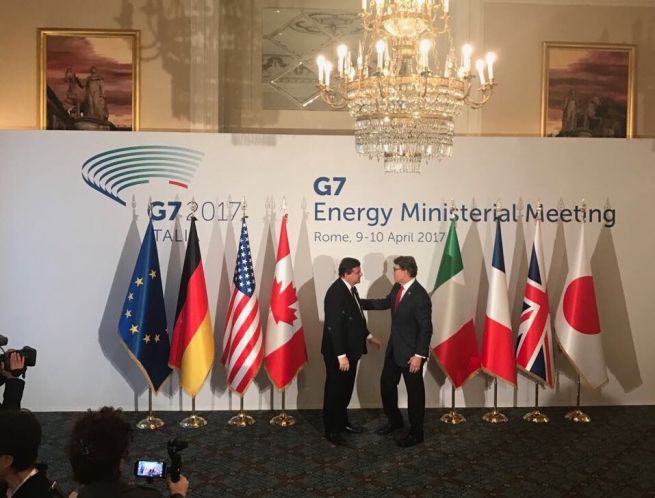G7 Calls for Fewer LNG Contract Restrictions
Energy ministers from the G7 industrialised nations concluded their April 10 meeting in Rome without reaching a joint statement on climate change, although they did call for a rollback of restrictions in LNG contracts, such as destination clauses.
Italy’s economic development Carlo Calenda, in his summary, described the talks as having been “fruitful and constructive” but said that US energy secretary Rick Perry had informed ministers “that the US is in the process of reviewing many of its policies and reserves its position on this issue, which will be communicated at a future date.”
Natural gas, Ukraine, and cyber-security in the energy sector were the three main topics discussed.
Calenda’s communique noted how all G7 energy ministers, plus EU energy and climate change commissioner Miguel Arias Canete “welcomed … the start of new and future LNG exports.”
“They reaffirmed the importance of greater flexibility of commercial clauses in LNG contracts, including relaxing destination clauses, and similar restrictive mechanisms. To this end, they encouraged the sharing of information, on a voluntary basis, of private sector and regulatory best practices,” added Calenda – with particular reference to two IEA reports in this field.
Buyers have been long campaigning to have destination clauses removed, without offering anything to the sellers in exchange. In March two Asian companies, Kogas and China National Offshore Oil Corp joined forces with the Japanese Chubu/Tepco LNG import and marketing joint venture, Jera, to pool resources and to lobby for a more market-oriented approach to LNG sales.
The G7 ministers welcomed the opening of new pipeline interconnections and new gas supply corridors – a probable reference to the Southern Gas Corridor that will bring gas to Europe from the Caspian region by around 2020. Russia was expelled from the G8 in 2014, after its annexation of parts of Ukraine.
On cyber-security, the G7 said that “relevant agencies and system operators should explore effective ways to implement collaboration and monitor progress achieved” including work with universities.

Italy's Carlo Calenda greets US energy secretary Rick Perry (Photo credit: Italy's economic development ministry/Twitter)
Ukraine urged to complete reforms
The G7 also “urged Ukraine to finalise and implement energy reforms, including work on a fully independent energy regulator, Naftogaz corporate governance reform, resilience planning, secure gas supplies, stepping up efforts on energy efficiency, and electricity and nuclear safety” and also urged the country to maintain its gas transmission network in good operating condition: “To this end, they supported continued co-operation among relevant G7, European and Ukrainian gas TSOs” (transmission system operators).
Last week, an EU-led intergovernmental agency said there were "serious shortcomings" in Ukraine's implementations of its energy reforms.
The US decision not to agree a climate change text came as the government’s Energy Information Administration April 10 released details of how a reduction in coal use, in favour of cheaper gas and even oil, saw US carbon dioxide emissions fall by 1.7% in 2016 – the last full year of the Obama presidency. The US was not a signatory to Kyoto but cheap shale gas allowed it to cut carbon emissions faster than many countries that were.
Of the G7 however, the UK has been the most successful in cutting emissions while boosting the economy over the last 25 years, according to the Energy and Climate Intelligence Unit, a non-profit organisation. In a report Conscious Decoupling published April 10, it said that in 2014 – the most recent year for which full figures across the G7 are available – UK per-capita greenhouse gas emissions were 33% down on 1992. UK per-capita GDP, meanwhile, grew by more than 130%.
Mark Smedley



